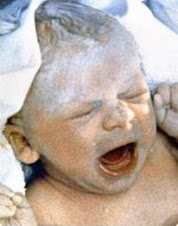Wednesday, August 13, 2008
PARENTS TELL IVF TECHNIQUE SUCCESS
Evie Bloomer is the first IVF baby to be born in the UK using a pioneering technique to freeze embryos.
And Evie's parents, Ian and Rebecca, said they wanted their story to inspire other childless couples trying for a baby not to give up hope.
The childhood sweethearts, from Cwmbran, South Wales, had been trying for a baby since they married in 2001. But tests revealed that Mrs Bloomer, 28, had endometriosis, a condition which was making it difficult for her to conceive.
Desperate for a baby, the couple attended the IVF clinic at the University Hospital of Wales, Cardiff. After one failed attempt the hospital offered the Bloomers a new way of freezing their unused embryos - embryo vitrification - that gave them a better chance of survival when they were ready to try again. Mrs Bloomer fell pregnant almost immediately using one of these embryos and became the proud mother of a healthy baby girl on July 23.
She said: "I hope that if anybody going through treatment sees us and sees Evie it gives them one last little bit of hope to go for it."
Lyndon Miles, head of embryology and andrology for IVF Wales, explained how it works: "Vitrification involves rapidly cooling and storing cells at very low temperatures for future use.
"An IVF cycle produces a number of embryos. Those that aren't immediately transferred back to the patient and that are of good enough quality are cooled slowly to the temperature of liquid nitrogen (-196C) and stored until needed.
"Conventional slow freezing creates ice crystals which can damage the embryo as it is thawed. Vitrification differs from traditional cooling and storing techniques in that it allows instantaneous 'glass-like' solidification of eggs and embryos without the formation of ice crystals. Since no ice crystals form, a much greater percentage of embryos survive thawing following vitrification. With conventional freezing methods, post-thaw survival rates vary from 50% to 80% whereas we have achieved 98% with vitrification."
Mr Miles said 17 out of the 39 women offered the treatment so far had fallen pregnant. Four of those are expecting twins.
He said the process would also be helpful to women diagnosed with cancer who want to freeze a number of eggs in case chemotherapy leaves them infertile. It may also be used to allow women to delay motherhood by "banking" eggs while they are at their fertile peak and using them later after fertility has declined.
SOURCE: The Press Association
Subscribe to:
Post Comments (Atom)
| Powered By widgetmate.com | Sponsored By Digital Camera |







No comments:
Post a Comment